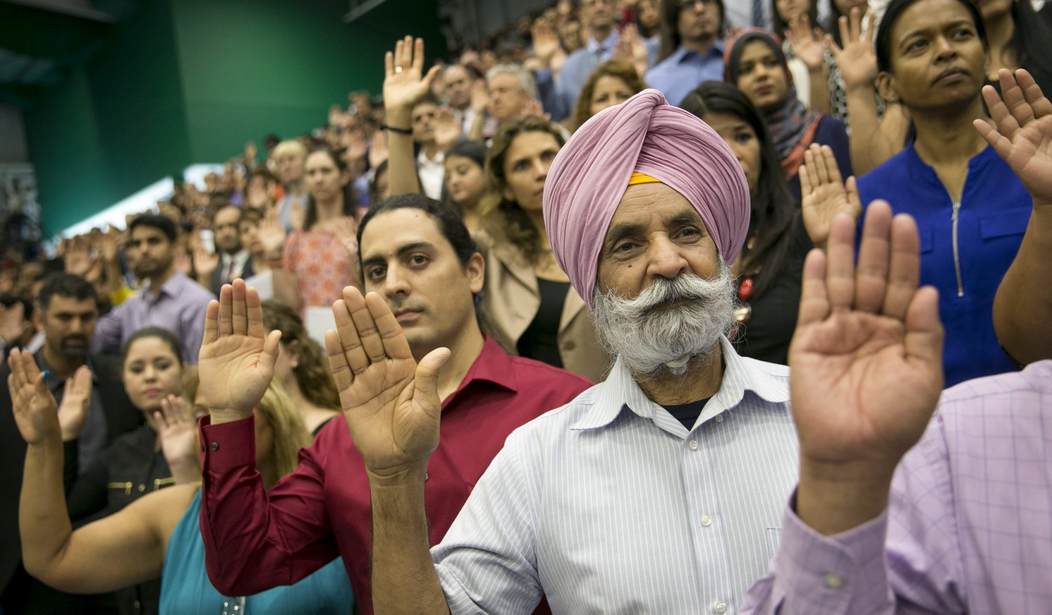WASHINGTON – Conservatives and libertarians are often portrayed as bedfellows, but the wide ideological differences were on full display Thursday evening when young party members debated everything from illegal immigration to digital privacy.
Two interns from the libertarian Cato Institute debated two interns from the conservative Hudson Institute on Cato’s stage, with the purpose of determining which political philosophy is superior.
“The solution to our immigration issues today is not a stricter enforcement of our current policy but rather a liberalization of our immigration law,” John Konicki, a junior political science and Russian studies major at Vanderbilt, argued from the libertarian perspective.
Konicki’s partner, Jack Brown, a law student at George Mason University, criticized conservatives for pitching the U.S. as the land of opportunity while building barriers to legal immigration. Among pathways for legal U.S. immigration are marriage, company sponsorship, refugee status and diversity lotteries, which Konicki said makes it “nearly impossible” for low-skilled workers to arrive legally. This dilemma, he said, is what fuels illegal immigration. He called on policymakers to remove barriers and allow individuals to move into the country freely, which, he argued, would boost the economy.
“Immigrants benefit our economy far more than they detract from it,” Konicki said, noting that conservatives no doubt would balk at the volume of applicants over fears of economic and security impacts.
Elle Rogers, a junior philosophy major at the King’s College in New York City, described the estimated 11.3 million illegal immigrants currently living in the U.S. as a net drain, while adding that in order to improve immigration policy the U.S. needs to first figure out how to enforce current laws on the books. She said that limitless freedom, which Konicki argued for, leads to anarchy. She pointed to 2015, when 32-year-old Kathryn Steinle was shot and killed in San Francisco, a sanctuary city, with an illegal immigrant arrested and charged with her murder. Conservatives like Rogers have cited myriad cases like Steinle’s in which American citizens have been killed by illegal immigrants, either through intentional violence or negligence.
“Enforcing the existing immigration laws preserves the existing structures that allow us to live in a diverse political community together,” Rogers said. “There’s an illegal immigration problem. We can either address it, or we can ignore it.”
She noted that about 60 percent of the illegal immigrant population is concentrated in about 20 cities, mainly sanctuary jurisdictions. Having inconsistencies between the law and enforcement, she said, invites chaos like that witnessed in San Francisco.
Rogers also pointed out that the status quo on immigration is unfair to the American taxpayer. She cited a Heritage Foundation study that in 2010 found that the average illegal immigrant household received about $24,000 in government benefits and services, while paying some $10,000 in taxes – a deficit of $14,000 per household.
Konicki shot back that the Heritage study focuses on the present loss of public schooling for the children in those households, but it ignores the fact that those same children will grow up to be taxpaying workers. Konicki claimed that unrestricted immigration would grow the world economy by $35 trillion to $100 trillion because many will immigrate to free market economies and become more productive. He also cited a “pessimistic” study from economist George Borhaus, who admits that immigration would raise wages for nearly 90 percent of the native population.
“While immigrants do increase the supply of workers, they also increase national consumption, and therefore increase the demand for workers,” Konicki said. “Conservatives also intend that immigration is detrimental in a welfare state, but given the positive effects of immigration on the economy this is more of an argument against the welfare state than it is against immigration.”
Rogers said it’s good that these children will grow up and contribute to society, but liberalizing the immigration system does nothing to address the 11.3 million illegal aliens in the United States. Yes, there is a debt to posterity, she said, but there’s also a debt to the current population of contributing U.S. citizens.









Join the conversation as a VIP Member